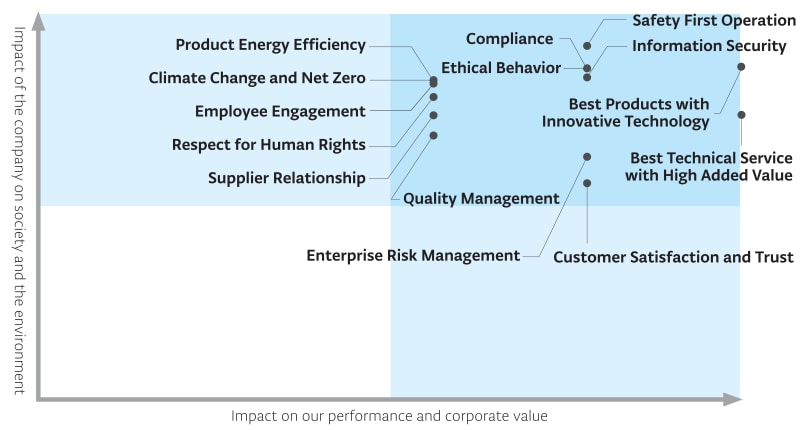Material issues
By practicing our Corporate Philosophy through the realization of our Vision, we aim to expand medium- to long-term profit and to continuously enhance our corporate value; to that end, we have identified key items that should be worked on with priority as our material issues, and these are reviewed each year.
Additionally, we are working continuously to create new value through the value chain of our business activities anchored around material issues.

Material Issues Identification Process
| Analyze environment and determine issues | We analyze the status of social issues and the SDGs, business environments, engagement with stakeholders*¹, results and key risks in our business activities*² to determine issues that could become our material issues.
|
| Prioritizing / Mapping | Determined issues are prioritized, then evaluated and mapped on two axes (double materiality): “Impact of the company on society and the environment,” taking into account stakeholder influence and interest, and “Impact on our performance and corporate value,” focusing on continuously enhancing corporate value. |
| Identifying Material Issues | We identified key items as material issues following discussions and decisions by the Corporate Officers Meeting, participated in by the CEO, and a report to and approval of the Board of Directors. In addition, we confirmed the material issues’ relation to key indicators for continuous corporate value enhancement*³ and the major 16 risk items, as well as the SDGs to be addressed. Furthermore, we organized the relation between the value chain and material issues. |
We obtain the advice of a third party specialist regarding consideration of the process by which we identify material issues.
Refer to Stakeholder Engagement
Refer to Risk Management
Refer to Integrated Report 2025 “Key Indicators for Continuous Corporate Value Enhancement”
Identified Material Issues
| Material Issues | Our Impact | Impact on Society | Main Initiatives | Identifying Material Issues | |
|---|---|---|---|---|---|
| Climate Change and Net Zero | Reduce the environmental impact of business activities, products and services to achieve net zero emissions | Create new opportunities by reducing climate change risks |   |
||
| Product Energy Efficiency | Achieve both the process performance and environmental performance of products | Preserve the global environment by providing environmentally friendly products |   |
||
| Best Products with Innovative Technology | Establish superiority by creating high-value-added products with innovative technology | Promote innovation and development of society through the evolution of semiconductors |   |
||
| Best Technical Service with High Value Added | Expand business opportunities by providing advanced field solutions that solve customer issues |
Improve semiconductor device yield and productivity, and maximize equipment utilization rates |   |
||
| Customer Satisfaction and Trust | Pursue customer satisfaction and build relationships of absolute trust as a sole strategic partner | Drive new innovations and further revitalize industry by providing added value |   |
||
| Supplier Relationship | Carry out activities such as development, improvement and quality improvement through collaboration | Maintain soundness and strengthen competitiveness throughout the supply chain |   |
||
| Respect for Human Rights | Reduce human rights risks and respect individual dignity in business activities | Solve social issues such as discrimination, inequality, and those related to labor and safety |   |
||
| Employee Engagement | Create an environment where individuals can maximize their abilities and work actively | Promote economic growth by building relationships of trust with stakeholders |
 |
||
| Safety First Operation | Achieve sustainable operations by putting safety first | Establish safety as a social foundation |  |
||
| Quality Management | Pursue management efficiency through quality-focused operations | Strengthen productivity and competitiveness through quality improvement |  |
||
| Compliance | Comply with laws, regulations, industry codes of conduct, etc. as the basis for corporate reliability and sustainable growth | Improve soundness of society by realizing social responsibility |  |
||
| Ethical Behavior | Strive to be a company with a strong sense of corporate social responsibility where our employees can take pride in their work and feel happy | Form a fair and orderly society |  |
||
| Information Security | Balance data utilization and information security by promptly tackling cyberattacks, information leaks, etc. | Ensure information security without sacrificing convenience |  |
||
| Enterprise Risk Management | Aim for sustainable growth by appropriately responding to business risks and their impacts | Sustainably develop the economy and society by eliminating and reducing risks |   |
||
